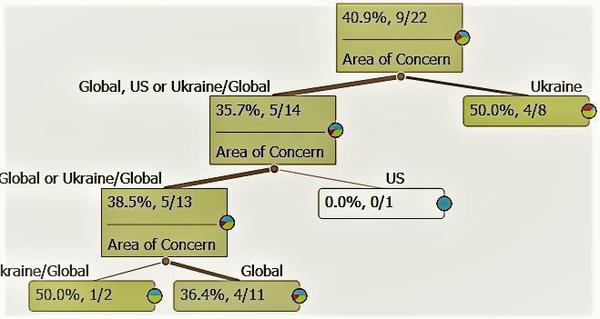
Intelligence Management Master’s: Reflective Essay
Rachael Riggs
National American University
Henley-Putnam School of Strategic Security
Dr. Jennifer Brooks-Kelley
September, 2023
Intelligence Management Master’s: Reflective Essay
Introduction
Upon graduating from Henley-Putnam School of Strategic Security with a Master’s degree in Intelligence Management, I cannot help but reflect on the fantastic journey that has led me to this moment. Looking back at where it first began, I am filled with pride and accomplishment for all the struggles I have faced and overcome.
Though I have never worked in the field, I became fascinated with Intelligence as I began noticing things around me and searching for answers. I grew a strong appreciation for it as I began to understand it.
When I started my degree, I was unsure where it would take me. As I continued through the journey, I realized my appreciation for this work, and this is where my career aspirations remain. Upon graduating from Henley-Putnam, I intend to continue with what I have learned and pursue a career in Intelligence as well as research and writing for the Intelligence Community.
Obtaining a master’s degree requires dedication, perseverance, and a relentless pursuit of knowledge. From the first day of my academic journey, I knew this path would not be without its challenges. However, it is through these challenges that we truly grow and discover our true potential. Throughout my time at Henley-Putnam, I have been exposed to a wealth of knowledge and expertise in the field of intelligence management. The faculty members have shaped my understanding and pushed me to think critically about complex security issues.
It is not just the academic lessons I will carry as I graduate. My personal growth has also come from navigating through this rigorous program. The long hours spent studying, the moments of self-doubt, and the triumphs over seemingly insurmountable obstacles have all shaped me into a stronger individual. Reflecting on my journey, I am reminded of the importance of perseverance and resilience. It is easy to become overwhelmed by challenges along the way, but it is through facing these challenges head-on that we can truly appreciate our accomplishments. Next, I will discuss the Program Learning Outcomes, What I have learned in the program, and how I will apply what I have learned to my future career endeavors.
Summary of The Five Program Learning Outcomes
There are five Program Learning Outcomes (PLOs) hoped to be achieved by all graduates of the Intelligence Management master’s degree program at NAU/ Henley-Putnam. The five PLOs of Intelligence Management are:
Critical Thinking and Problem Solving
PLO M1: Use critical thinking and problem-solving skills to evaluate options for preventive, deterrent, and response actions related to the intelligence management profession.
Professional Competence
PLO M2: Critique information from various sources to debate its relevance to address issues of intelligence management.
Communication
PLO M3 (M5): Communicate clearly and effectively in various mediums to various stakeholders both within and external to the intelligence management profession.
Collaboration
PLO M4: Work collaboratively in diverse groups to formulate solutions to prevent and forestall emerging threats within the intelligence management profession.
Personal and Social Responsibility
PLO M5: Apply ethical and civic-minded approaches to policy and reform within the intelligence management profession.
PLO1: Critical Thinking and Problem-Solving
Critical Thinking and Problem-Solving are the ability to look at and analyze the information available to you while being aware of any bias or assumptions to solve problems effectively. This first Program Learning Outcome of Critical Thinking and Problem Solving is witnessed with the "Russia in War" assignment from INT570: All Source Intelligence.
This assignment enabled me to view the outcome from a non-biased viewpoint. I used predictive analytics and models to determine a result using the "Orange" software. In evaluating the evidence, I could see the whole picture as it was and understand the importance of using models in helping an analyst to use critical thinking and problem-solving.
With this assignment, I learned how to use different predictive models and was amazed at their ability to predict in the ways they can. I found how much I enjoyed using these models and had fun with this software. This class and this assignment gave me this awareness and ability to understand how to use models and their importance in an analyst’s final assessment
while also understanding the importance of not relying too heavily on models due to the possibility of overlooking important information.
I remember the moment I connected with the models, critical thinking, and the ability to combine this to solve problems. I remember the moment I had while working with the model used in the assignment. I also realized I had learned this when I began using many of the everyday questions I had in analytical models, using these models to determine the best or most likely outcomes. Because of this, I have achieved the Program Learning Outcome of critical thinking and problem-solving.
Critical thinking is a crucial skill for not just Intelligence but also in life. The ability to look at information from various angles and realize your bias and pre-judgments is essential.
PLO2: Professional Competence
Professional Competence is properly utilizing technical knowledge and skills related to one's profession. It is a combination of training, skills, experience, and knowledge that a person has acquired and their ability to apply them to perform a task.
PLO2: Professional Competence can best be seen in an assignment from PRO596: Advanced Protective Intelligence. The project that shows I have achieved this skill is "Protective Intelligence for Selena Gomez Threat Assessment: Thomas Brodnicki."
This assignment allowed many different sources to help create a finished intelligence product. In compiling a behavior threat assessment, using as many sources as possible to create the most comprehensive analysis to best understand the person being analyzed was essential.
When creating this type of intelligence file, it truly helps you to understand how essential it can be to use as many sources as possible and to obtain as much evidence and history of the person as possible so that the individual is analyzed appropriately and the end product is as accurate as it has the potential to be.
This assignment was the first where I created a behavior assessment and the project where I really learned how much I enjoyed behavior analysis and making behavior threat assessments. Because of this class and working through this assignment, I chose to take my final elective course in PRO690: Advanced Threat Assessment.
I know that I have acquired the skills of professional Competence in threat assessments because I have used the skills I learned to create my own behavior threat assessments to help me in my own life to understand a person and their behavior as well as any threat level. This skill is a skill I have often wanted to use but needed to learn how or even that it was something that people utilized to determine threats.
Professional Competence is a vital skill for a person in their career field. One must understand the expectations in one's job and the key behaviors and essential knowledge to handle the tasks assigned correctly.
PLO3: Communication
The third PLO, Communication, is communicating successfully visually and verbally with an interested party using various mediums. The assignment that best showcases PLO3 is a PowerPoint presentation from INT511: Advanced Analytical Methods, titled "Technology Analysis 2021-2024: Understanding Which Technological Advances Bring the Largest Threats to Our Nation," combined with the essay.
This PowerPoint allowed me to exchange information through a visual mode of expression. The assignment created a way to communicate with those in the security industry and those outside the industry. I used a well-designed visual piece to effectively present the information in an easy-to-understand and visually appealing format.
In addition, to complement the PowerPoint, I wrote an essay that further detailed the knowledge that the PowerPoint could not address in its limited space. The report and PowerPoint were a great combination to establish this program learning outcome and understand how information can be communicated to others while giving the person receiving the information multiple formats to understand the Intelligence.
I have achieved this learning outcome because I used the knowledge gained in this course for my work, creating a PowerPoint and invitations for the induction ceremony while volunteering as an officer for the Order of the Sword and Shield National Honor Society. I used the information I had learned in the course to aid in creating an excellent resource for the new inductees and a way for them to communicate and receive the necessary information.
It is essential to achieve communication learning outcomes to deliver the necessary and relevant information to those who need it, both in person and virtually. Also crucial to the intelligence field and other careers is the ability to brief others using visual and verbal methods to deliver information quickly.
PLO4: Collaboration
Collaboration refers to the ability of a person to work with others to create something or achieve the same goal. The fourth Program Learning Outcome hopes the student achieves collaboration skills, which is witnessed in the course INT521: Advanced Intelligence Collection with the assignment, "Counternarcotics: How Can We Better Track Drug Cartels."
Collaboration can be witnessed with the Priority Intelligence Requirements and the tasking and cooperation with other agencies. The assignment shows the importance of working with many agencies to accomplish the necessary goals and obtain the desired outcome.
While this assignment did not allow me to collaborate with anyone, it was an excellent opportunity to understand how this type of collaboration is achieved, tasked, and managed. My collaboration skills have been witnessed in group assignments and with my work with the Order of the Sword and Shield National Honor Society as we invited inductees and created a well-designed induction ceremony.
Collaboration is another essential skill that is not only important in a career but also as a life skill. Collaboration is a great way to look at problems from different angles to solve them better. It can produce innovative ideas, improve efficiency, and increase success, confidence, and motivation.
PLO5: Personal and Social Responsibility
Personal and social responsibility is the ethical and responsible contribution to all individuals, the community, the environment, and the workplace.
SEC665: Cybersecurity solidifies that I achieved this goal with the assignment "Cyberstalking/Cyber-Harassment: Understanding this Type of Criminal to Aid in Convictions."
This assignment provided an ethical and civic-minded approach to a current issue in the intelligence community. Approaching Cyberstalking and cyber harassment is a new issue within law enforcement, and many agencies are still grappling with how best to deal with this problem. Training employees and helping them to understand the issues involved will take time, understanding, and new approaches. This paper touches on policy and reform and discusses ways to implement different techniques to help with the issues currently seen in law enforcement.
This assignment taught me a lot, from the paper's layout to the details inside, including the literature review. I took the research questions very seriously and wanted to create a document that provided a helpful resource to law enforcement and brought awareness to Cyberstalking and Cyber-Harassment. I hoped this paper would be viewed and help to make this a higher-priority issue. Because of this, I am confident that I have achieved the program learning outcome of Personal and social responsibility.
This essential learning outcome skill is so important because being socially aware and responsible means that a person will positively contribute to their community and society. People with this skill can empathize with others and help others achieve goals that benefit the community. Those with this skill are more likely to volunteer their time and create innovative ideas to help stand up for the rights of others and ultimately be positive change-makers in our society.
Conclusion
Throughout this journey, each assignment I have done has provided me with valuable insights and "aha" moments, and developing the necessary skills to achieve those outcomes helped me grasp the skills in critical thinking and problem solving, professional Competence, communication, collaboration, personal and social responsibility, qualitative and quantitative analysis, information literacy and how these skills contribute to intelligence work and affect decision makers. It has been a journey of knowledge and brought new awareness since the beginning of my master's program.
The abovementioned assignments have played a crucial role in my growth by challenging me to think critically, analyze complex topics, and apply theoretical concepts to real-world scenarios. Each task has pushed me to expand my understanding and demonstrate mastery in various areas.
Since embarking on this master's journey, I have gained incredible knowledge and a new level of self-awareness. The course has challenged me to think critically, expand my perspectives, and push past my comfort zone. As a result, I feel more confident in my abilities than ever before. I can proudly and confidently say I have mastered the expected outcomes, and I am more than capable of working in this profession with the desired knowledge that an employer would hope from a master's graduate in intelligence management.
I am filled with gratitude for all those who have stood by me and supported me throughout this journey, and I am so thankful for the professors and mentors who shared their wisdom and expertise. The instructors I have had while achieving my master's degree are the best instructors one could hope to have. As I prepare to graduate with my master's degree in Intelligence Management, I am excited about what lies ahead. With newfound knowledge and skills gained through rigorous coursework and practical experiences, I am ready to make a meaningful impact on strategic security.
Obtaining a master's degree is not just about the piece of paper we receive at the end. It is about personal growth, the challenges overcome, and the knowledge gained along the way. Reflecting upon my journey, I am filled with gratitude and excitement for what lies ahead. What I have learned has enabled me to work confidently in intelligence.
In addition to a career in Intelligence, I also aim to author a book or guide about my experiences that led me to pursue a degree in Intelligence, and I hope that I can effectively collaborate and contribute to the intelligence field in some way with this to create something that can benefit many.
 Filters & Sorting
Filters & Sorting




